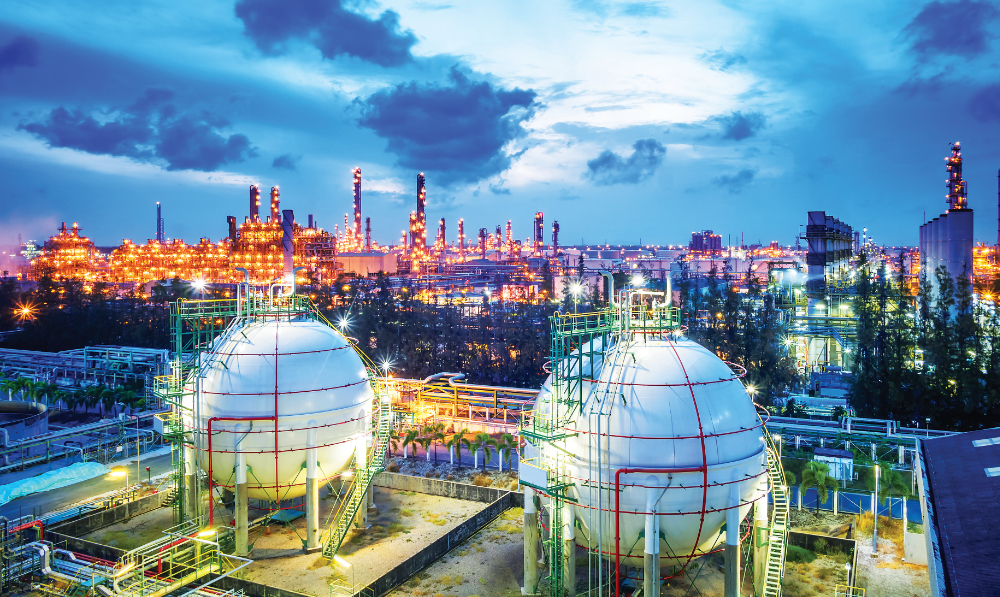RIYADH: Global gas prices are expected to remain high driven by greater demand from the post-pandemic recovery, low storage capacity, and tensions in Ukraine, according to a report by the US Energy Information Administration.
The natural gas spot price on the US benchmark Henry Hub will average $3.92 per million British thermal units in 2022, an eight-year high according to the administration earlier this month.
This comes on the back of several price rises that have seen global wholesale gas prices jump fourfold over the last 12 months.
In the US on Feb. 18, natural gas futures closed at $4.42, a 12 percent rise from $3.96 posted on Feb. 10, which represents a 19 percent year-to-date surge.
Gas prices are also being driven by fewer liquefied natural gas tanker deliveries to Europe as a result of increased demand from Asia.
“This winter’s energy crunch in Europe and China have driven up demand for gas, including liquefied natural gas, and that is reflected in high prices,” said Raad Al-Kadiri, managing director, energy, climate and resources at consultancy Eurasia Group in an interview with Arab News.
He added: “Part of this is a product of energy transitions, especially in China, where the country is undergoing a massive household gasification program, which has increased demand for LNG.”
In Europe, a combination of a cold winter and supply shortfalls from Russia has pushed up prices. These pressures have increased as a result of fears surrounding the crisis in Ukraine between Russia and the West, where the threat of sanctions against Moscow could lead to cuts in Russian gas exports.
Unlike oil, where the consuming countries hold strategic stocks to offset the risk of a fall in output, gas storage stocks are traditionally low.
“In the short term, this is forcing Europe to look to diversify gas supplies, with LNG being one alternative that is being pursued,” added Al-Kadiri.
US policymakers are reportedly scouring the globe for alternative sources of gas if a conflict between Ukraine and Russia interrupts gas supplies to Europe.
Its top officials have held talks with producer Qatar as well as consuming countries in Asia, including China, over diverting LNG cargoes to Europe, according to a Reuters report earlier this month.
Qatar is the world’s largest holder of proven gas reserves after Russia and Iran thanks to its North Field, which alone holds around 900 trillion standard cubic feet of gas, approximately 10 percent of the world’s known reserves.
“Higher prices will benefit the treasuries of gas exporters like Qatar, which has the capacity to supply these markets. It gives Qatar renewed strategic importance, as it can use its gas supply capacity to bolster its geopolitical influence as a supplier of last resort,” Al-Kadiri noted.
Fresh global demand for gas also comes as the UAE expands its LNG capacity.
“This means that it will try to lock in higher prices in new contracts, as well as benefit from spot sales,” said Al-Kadiri. Spot sales are one-off deals for specific volumes of gas to be delivered at an agreed date, location and price.
These crises have underscored the important role gas will play, as a transition fuel as world economies move to green energy.
“In China, gasification is the first step away from a reliance on coal. In Europe, there is a debate over whether gas should be classified as ‘green,’ but the latest crisis is likely to convince policymakers of the need for the fuel, added Al-Kadiri.
Despite the gas crisis, investment in renewable fuel will nonetheless continue worldwide. “Both China and the EU are committed to energy transitions. These latest crises appear to have spurred greater determination to change their energy mixes rather than undermine policy efforts”, added the consultancy director.
But whether the energy crisis will push Gulf and MENA countries to exploit untapped gas reserves remains to be seen.
“The issue is how long gas demand will hold up over the long term. Gulf countries have always paid attention to gas. But they are also putting a lot of money into renewables for domestic power generation,” said Al-Kadiri.

